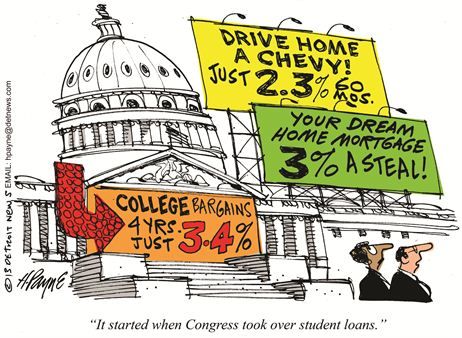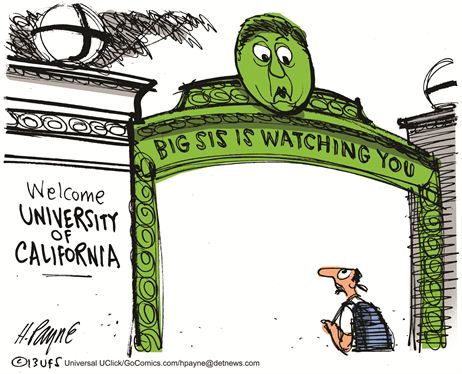Monday Morning Humor for July 22nd starting out with this video:
Cartoons:





Monday Morning Humor for July 22nd starting out with this video:
Cartoons:





House GOP leaders are scrambling to quell a quiet libertarian rebellion that threatens to block consideration of the Defense appropriations bill.
A small group of Republicans are holding the spending bill hostage until they get votes on several controversial amendments.
“We’ve conveyed to the whip team that we won’t vote for the rule if they don’t allow debate and votes,” Thomas Massie, R-Ky., said Friday. “We don’t need all the amendments to be allowed. We need at least one substantial amendment on three things: Egypt, Syria and NSA.”
Massie has two amendments before the Rules Committee: one that would defund military operations in Syria and one that would defund military operations in Egypt. Another leader in the Republican rebellion, Justin Amash of Michigan, has an amendment that would end funds for the National Security Agency’s blanket collection of telephone call records in the wake of Edward Snowden’s leaking of the program.
Rules Committee member Rich Nugent, R-Fla., has a similar NSA amendment, but the libertarian lawmakers say it insufficiently addresses the issue.
GOP leaders have been coming off a string of impressive victories lately — from passing the farm bill without a single Democratic vote to navigating a No Child Left Behind rewrite. But the Rules Committee postponed their meeting Thursday on the Defense appropriations bill, and leaders are still figuring out if they have the votes to squash the Republican revolt.
Majority Whip Kevin McCarthy, R-Calif., has pleaded with lawmakers in the group to not shoot down the rule and, consequently, shoot Republicans in the foot.
According to an aide to one lawmaker in the group threatening to vote down the rule, leadership has used “every tool in the toolbox” to block the amendments. The aide said they have faced a number of procedural roadblocks, from leadership saying their amendments legislate on an appropriations bill to having their amendments submitted to the Congressional Budget Office for a score. The aide said it has been a “concerted effort.”
But the lawmakers have cleared the hurdles, they say, and they want votes. They are drafting a letter calling for the opportunity to vote on their amendments, and they are seeking signatories.
On Friday, Jim McGovern, D-Mass., who will be controlling the Defense appropriations rule on the floor for the Democrats, said the Republican Conference is “just chaos.”
“They can’t seem to get their act together. So they got a problem,” McGovern said. “The Republican leadership long ago lost the ability to lead.”
McGovern, who is also a Rules panel member, said Democrats were initially told the Rules Committee was delaying its Thursday meeting on the Defense appropriations bill “out of deference to us” so Democrats could vote in the ranking member of the Natural Resources election, even though no Democrat asked the committee to delay the hearing.
“And then they delayed for another hour, and then they delayed it indefinitely and never told us why,” McGovern said. “We all know why: It’s because of these NSA votes.”
The Rules Committee plans to mark up the rule for the Defense appropriations bill at 5 p.m. on July 22, and Majority Leader Eric Cantor, R-Va., said Friday that the House will consider the DOD appropriations bill next week.
—-
Click below for the full article.
http://blogs.rollcall.com/goppers/gop-leaders-face-libertarian-rebellion/

The Affordable Care Act now has a formidable opponent in U.S. labor unions. The unions were a key ally in the law’s passage: They spent a large sum of money on the congressional campaigns of Democrats in 2006 and 2008, and union leaders lobbied in favor of health care reform in 2009 and 2010. But with growing worries that the legislation will disrupt the health benefits of its members, America’s largest unions are asking Congress to step in.
Representatives of three of the nation’s largest unions sent a letter to Democratic Sens. Harry Reid of Nevada and Nancy Pelosi of California on Thursday.
“When you and the President sought our support for the Affordable Care Act, you pledged that if we liked the health plans we have now, we could keep them. Sadly, that promise is under threat,” letter said. “Right now, unless you and the Obama Administration enact an equitable fix, the ACA will shatter not only our hard-earned health benefits, but destroy the foundation of the 40 hour workweek that is the backbone of the American middle class.”
——-
Click below for the full article.
A Washington state man who illegally fired a shotgun blamed his action on a piece of advice doled out by Vice President Joe Biden earlier this year.
“I did what Joe Biden told me to do,” Jeffrey Barton told Washington affiliate KOIN. “I went outside and fired my shotgun in the air.”
Barton pleaded not guilty to one count of illegal aiming or discharging a firearm Wednesday after firing a shotgun in the air as he chased away people he thought were trying to break into his car.
In an online town-hall discussion in February, Biden, who was one of the administration’s lead speakers on the issue of gun control, offered advice in a hypothetical situation about how to fend off home intruders.
“I said, ‘Jill, if there’s ever a problem, just walk out on the balcony here, walk out and put that double-barrel shotgun and fire two blasts outside the house,’” Biden said.
“You don’t need an AR-15,” he said. “It’s harder to aim, it’s harder to use, and in fact you don’t need 30 rounds to protect yourself.”
“Buy a shotgun,” he concluded.
——
The Liberty Report Take: Regardless on one’s stance on the Second Amendment, gun control, or gun rights, perhaps it isn’t best to listen to the VP of the United States for personal safety tips…….
Click the link for the article below.
http://abcnews.go.com/blogs/politics/2013/07/man-illegally-fires-shotgun-blames-biden-advice/

In a heated confrontation over domestic spying, members of Congress said Wednesday they never intended to allow the National Security Agency to build a database of every phone call in America. And they threatened to curtail the government’s surveillance authority.
Top Obama administration officials countered that the once-secret program was legal and necessary to keep America safe. And they left open the possibility that they could build similar databases of people’s credit card transactions, hotel records and Internet searches.
The clash on Capitol Hill undercut President Barack Obama’s assurances that Congress had fully understood the dramatic expansion of government power it authorized repeatedly over the past decade.
The House Judiciary Committee hearing also represented perhaps the most public, substantive congressional debate on surveillance powers since the 9/11 terrorist attacks. Previous debates have been largely theoretical and legalistic, with officials in the Bush and Obama administrations keeping the details hidden behind the cloak of classified information.
That changed last month when former government contractor Edward Snowden leaked documents to the Guardian newspaper revealing that the NSA collects every American’s phone records, knowing that the overwhelming majority of people have no ties to terrorism.
Civil rights groups have warned for years that the government would use the USA Patriot Act to conduct such wholesale data collection. The government denied it.
The Obama administration says it needs a library of everyone’s phone records so that when it finds a suspected terrorist, it can search its archives for the suspect’s calling habits. The administration says the database was authorized under a provision in the Patriot Act that Congress hurriedly passed after 9/11 and reauthorized in 2005 and 2010.
The sponsor of that bill, Rep. James Sensenbrenner, R-Wis., said Wednesday that Congress meant only to allow seizures directly relevant to national security investigations. No one expected the government to obtain every phone record and store them in a huge database to search later.
As Deputy Attorney General James Cole explained why that was necessary, Sensenbrenner cut him off and reminded him that his surveillance authority expires in 2015.
“And unless you realize you’ve got a problem,” Sensenbrenner said, “that is not going to be renewed.”
He was followed by Rep. Jerry Nadler, D-N.Y., who picked up where his colleague left off. The problem, he said, is that the administration considers “everything in the world” relevant to fighting terrorism.
Later, Rep. Blake Farenthold, R-Texas, asked whether the NSA could build similar databases of everyone’s Internet searches, hotel records and credit card transactions.
Robert S. Litt, general counsel in the Office of Director of National Intelligence, didn’t directly answer, saying it would depend on whether the government believed those records — like phone records — to be relevant to terrorism investigations.
After the phone surveillance became public, Obama assured Americans that Congress was well aware of what was going on.
“When it comes to telephone calls, every member of Congress has been briefed on this program,” he said.
Whether lawmakers willingly kept themselves in the dark or were misled, it was apparent Wednesday that one of the key oversight bodies in Congress remained unclear about the scope of surveillance, more than a decade after it was authorized.
The Judiciary Committee’s senior Democrat, Rep. John Conyers of Michigan, noted that the panel had “primary jurisdiction” over the surveillance laws that were the foundation for the NSA programs. Yet one lawmaker, Rep. Ted Poe, R-Texas, said some members of Congress wouldn’t have known about the NSA surveillance without the sensational leaks: “Snowden, I don’t like him at all, but we would never have known what happened if he hadn’t told us.”
The NSA says it only looks at numbers as part of narrow terrorism investigations, but that doesn’t tell the whole story.
For the first time, NSA deputy director John C. Inglis disclosed Wednesday that the agency sometimes conducts what’s known as three-hop analysis. That means the government can look at the phone data of a suspect terrorist, plus the data of all of his contacts, then all of those people’s contacts, and finally, all of those people’s contacts.
If the average person calls 40 unique people, three-hop analysis could allow the government to mine the records of 2.5 million Americans when investigating one suspected terrorist.
Rep Randy Forbes, R-Va., said such a huge database was ripe for government abuse. When Inglis said there was no evidence of that, Forbes interrupted:
“I said I wasn’t going to yell at you and I’m going to try not to. That’s exactly what the American people are worried about,” he said. “That’s what’s infuriating the American people. They’re understanding that if you collect that amount of data, people can get access to it in ways that can harm them.”
The government says it stores everybody’s phone records for five years. Cole explained that because the phone companies don’t keep records that long, the NSA had to build its own database.
——
Click below for the full article.
http://news.yahoo.com/nsa-spying-under-fire-youve-got-problem-164530431.html
The Federal Reserve’s proposed timetable for tapering its bond-buying program is not set in stone, said Federal Reserve Chairman Ben Bernanke on Wednesday. “I emphasize that, because our asset purchases depend on economic and financial developments, they are by no means on a preset course,” Bernanke said in remarks prepared for delivery to the House Financial Services Committee. Bernanke repeated his guidance from mid-June that the Fed anticipates it will be appropriate to begin to moderate the pace of purchases “later this year,” and end them “around midyear.” The Fed chairman said the central bank would react to developments. If economic conditions were to improve faster that expected, the pace of asset purchases could be reduced “somewhat more quickly.” But if the outlook were to become relatively less favorable, or if financial conditions were seen as too tight, “the current pace of purchases could be maintained for longer,” Bernanke said. The chairman’s prepared remarks were fairly dovish. He said the economy remained vulnerable to shocks and there was a risk that a dispute in Congress over the debt ceiling could hamper the recovery.
——
Click below for the full article.
Due largely to unauthorized leaks, we now know that the National Security Agency has seized from private companies voluminous data on the phone and Internet usage of all U.S. citizens. We’ve also learned that the United States Foreign Intelligence Surveillance Court has approved the constitutionality of these seizures in secret proceedings in which only the government appears, and in opinions kept secret even from the private companies from whom the data are seized.
If this weren’t disturbing enough, the Consumer Financial Protection Bureau, created by the 2010 Dodd-Frank financial reform, is compiling a massive database of citizens’ personal information—including monthly credit-card, mortgage, car and other payments—ostensibly to protect consumers from abuses by financial institutions.
All of this dangerously violates the most fundamental principles of our republican form of government. The Fourth Amendment has two parts: First, “The right of the people to be secure in their persons, houses, papers, and effects, against unreasonable searches and seizures, shall not be violated.” Second, that “no warrants shall issue, but upon probable cause, supported by oath or affirmation, and particularly describing the place to be searched, and the persons or things to be seized.”
By banning unreasonable “seizures” of a person’s “papers,” the Fourth Amendment clearly protects what we today call “informational privacy.” Rather than seizing the private papers of individual citizens, the NSA and CFPB programs instead seize the records of the private communications companies with which citizens do business under contractual “terms of service.” These contracts do not authorize data-sharing with the government. Indeed, these private companies have insisted that they be compelled by statute and warrant to produce their records so as not to be accused of breaching their contracts and willingly betraying their customers’ trust.
As other legal scholars, most notably Yale law professor Akhil Reed Amar, have pointed out, when the Fourth Amendment was ratified in 1791 as part of the Bill of Rights, government agents were liable for damages in civil tort actions for trespass. The Seventh Amendment preserved the right to have a jury composed of ordinary citizens pass upon the “reasonableness” of any searches or seizures. Because judges were not trusted to jealously guard the liberties of the people, the Fourth Amendment restricted the issuance of warrants to the heightened requirements of “probable cause” and specificity.
Over time, as law-enforcement agents were granted qualified immunity from civil suits, it fell mainly to judges to assess the “reasonableness” of a government search or seizure during a criminal prosecution, thereby undermining the original republican scheme of holding law enforcement accountable to citizen juries.
True, judges have long been approving search warrants by relying on ex parte affidavits from law enforcement. With the NSA’s surveillance program, the Foreign Intelligence Surveillance Court has apparently secretly approved the blanket seizure of data on every American so this “metadata” can later provide the probable cause for a particular search. Such indiscriminate data seizures are the epitome of “unreasonable,” akin to the “general warrants” issued by the Crown to authorize searches of Colonial Americans.
Still worse, the way these programs have been approved violates the Fifth Amendment, which stipulates that no one may be deprived of property “without due process of law.” Secret judicial proceedings adjudicating the rights of private parties, without any ability to participate or even read the legal opinions of the judges, is the antithesis of the due process of law.
In a republican government based on popular sovereignty, the people are the principals or masters and those in government are merely their agents or servants. For the people to control their servants, however, they must know what their servants are doing.
The secrecy of these programs makes it impossible to hold elected officials and appointed bureaucrats accountable. Relying solely on internal governmental checks violates the fundamental constitutional principle that the sovereign people must be the ultimate external judge of their servants’ conduct in office. Yet such judgment and control is impossible without the information that such secret programs conceal. Had it not been for recent leaks, the American public would have no idea of the existence of these programs, and we still cannot be certain of their scope.
Even if these blanket data-seizure programs are perfectly proper now, the technical capability they create makes it far easier for government to violate the rights of the people in the future. Consider why gun rights advocates so vociferously oppose gun registration. By providing the government with information about the location of private arms, gun registries make it feasible for gun confiscation to take place in the future when the political and legal climate may have shifted. The only effective way to prevent the confiscation of firearms tomorrow is to deprive authorities of the means to do so today.
Like gun registries, these NSA and CFPB databanks make it feasible for government workers to peruse the private contents of our electronic communication and financial transactions without our knowledge or consent. All it takes is the will, combined with the right political climate.
—–
The Liberty Report Take: Someone in Washington should/needs to put a stop to these unreasonable data seizures.
Click below for the full article.
http://online.wsj.com/article/SB10001424127887323823004578593591276402574.html
Homeland Security Secretary Janet Napolitano is resigning to become president of the University of California system. Republican politicians such as Sen. John McCain (R-Ariz.) and Rep. Mike McCaul (R-Tex.) quickly praised Napolitano when news of her resignation broke, with McCain saying she “served our nation with honor” and McCaul touting her as “someone who does not underestimate the threats against us.”
Fortunately, not all Republican members of Congress are as enthusiastic when it comes to America’s bloated and malignant security state. “Secretary Napolitano’s departure comes not a minute too soon,” said Rep. John Mica (R-Fla.). “Now is a good time for Congress to consider dismantling the monstrous Department of Homeland Security and replacing it with a smaller security focused entity that is realistically capable of connecting the dots of threats posed to our national security.” Hear, hear, Rep. Mica.
News of Napolitano’s resignation deserves one response from civil libertarians and those in favor of risk-based security policy: Don’t let the door hit you on the way out. Among other unsavory deeds, for her entire tenure, she allowed the Transportation Security Administration to illegally deploy whole-body imaging scanners in airports. Until a court ordered the TSA in July 2011 to conduct the legally mandated regulatory proceeding, officials at the Department of Homeland Security maintained that such basic lawful administrative procedures were unnecessary and the public had no right to officially comment on the use of the machines. It then took over a year and a half for the TSA to open the regulatory proceeding in March 2013, something it should have done in 2009 before deploying the scanners in the first place.
—
Click below for the full article.